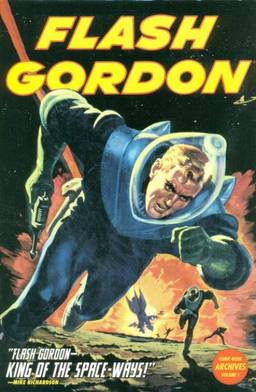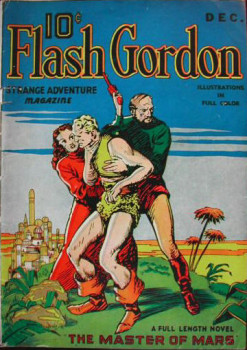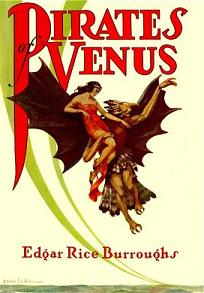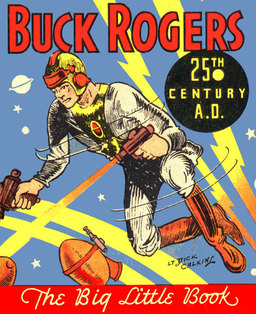What Would it Look Like to Pull a Watchmen on Planetary Romance? Part III
 When we last left our intrepid blogger (me) two weeks ago and four weeks ago, he was blogging (very roughly) about the superhero genre, pre- and post-Watchmen, and the kind of light that Alan Moore’s Watchmen shone onto superhero comics, as well as the core elements of the planetary romance form. I was setting up this conversation about what a Watchmen-like treatment of planetary romance would look like, both the pretty parts and the ugly ones.
When we last left our intrepid blogger (me) two weeks ago and four weeks ago, he was blogging (very roughly) about the superhero genre, pre- and post-Watchmen, and the kind of light that Alan Moore’s Watchmen shone onto superhero comics, as well as the core elements of the planetary romance form. I was setting up this conversation about what a Watchmen-like treatment of planetary romance would look like, both the pretty parts and the ugly ones.
This is a fun exercise and it’s quite possible that I’m way off in what I construct next, so if I am, please offer up your ideas, views, suggestions. Debate is good!
And, I’ve been ending on a cliffhanger, like any good pulp. So now, here’s Part III, What a Watchmen Treatment of Planetary Romance Might Look Like….
We’ll need a hero, a youngish white male paragon to travel to another world, because that’s the core of the form. And let’s have the aliens of this world be as close to humans as possible in physique and psychology, otherwise other assumptions become much harder to play with.
While Carson traveled to Venus, Carter to Barsoom, and Rogers to the future by themselves, we may need companions for the hero, like Flash Gordon did. And for later grist for the dramatic mill, it will probably serve us that one is a strong, well-characterized, complex woman, preferably from another political viewpoint or culture.
 The third would be a person of a third human culture, to give us a base from which to move away from the American-centric view and to better reflect the make-up of our planet. Just to label, let’s call the hero Smith, the woman Radulovic (of Serbian descent), and the third al’Barri (of Iraqi descent).
The third would be a person of a third human culture, to give us a base from which to move away from the American-centric view and to better reflect the make-up of our planet. Just to label, let’s call the hero Smith, the woman Radulovic (of Serbian descent), and the third al’Barri (of Iraqi descent).
They travel to a world that is struggling, seeking an easy solution to a complex problem, perhaps military or political in nature. Let’s pick the old planetary romance trope of a people living under a dictatorship.
The reason I set this up as a people looking for an easy solution is because so often in pulps and planetary romance, the hero fantasy appeal is in the manifest destiny of the hero, the idea that American gumption, plain-speak, and folksy boldness are all that is needed for an individual to catalyze change.
Also very important in the hero fantasy is the fact that these heroes do have something that makes them powerful – Carson knew how to build an aircraft, Carter had his muscles. Let’s give our humans some edge to make their interventions weightier.
Let’s see where this goes. Our three humans arrive, witness an obvious situation of oppression, and have to decide what to do. Smith is for liberating these peoples. And let’s give him an advantage: the arrival of the humans is a destabilizing event that throws into question political, religious, and social ideas.
 But in our story, he’s got Radulovic and al’Barri with him, and contrary to the classic planetary romance, they are protagonists in their own right with their own cultural and political views. This not only gives us conflict and debate, but gives us thematic perspective, much as Rorschach, Ozymandias, Silk Spectre, the Comedian, and Dr. Manhattan gave us different thematic ins into the idea of superheroes.
But in our story, he’s got Radulovic and al’Barri with him, and contrary to the classic planetary romance, they are protagonists in their own right with their own cultural and political views. This not only gives us conflict and debate, but gives us thematic perspective, much as Rorschach, Ozymandias, Silk Spectre, the Comedian, and Dr. Manhattan gave us different thematic ins into the idea of superheroes.
So, let’s say that in response to Smith’s “let’s free these people,” Radulovic notes the undercurrents of hostility among the different oppressed cultures. Think of the seismic political instabilities of the Serbs and Croats and Muslims under Tito. And let’s say that al’Barri notes the lack of alternative political structures to fill a power vacuum, should the current tyrant be toppled.
We haven’t lost the idea of a heroic planetary romance hero yet, nor have we made him unsympathetic. His intentions are honest and good, but it’s quite possible that the endgame of an idyllic democracy is simply not one of the available options.
One thing I should note is the irony of planetary romances glorifying the export of an idealized American morality to the stars, at a time when corruption and crime in the United States was paving the way for the arrival of vigilante super-heroes on news stands. But, we digress…
 Our rebooted planetary romance allows for the fracturing of the unity of the three humans. Smith can go with the faction that is ready to topple the tyrant now, and he can have an important action role in that process, and even be a hero covered in glory. Radulovic can associate with a different faction, one wary of Smith’s group, having suffered long grievances with them. And al’Barri may try to ready the people who have no political voice, either under the tyrant or under the leaders of the various factions.
Our rebooted planetary romance allows for the fracturing of the unity of the three humans. Smith can go with the faction that is ready to topple the tyrant now, and he can have an important action role in that process, and even be a hero covered in glory. Radulovic can associate with a different faction, one wary of Smith’s group, having suffered long grievances with them. And al’Barri may try to ready the people who have no political voice, either under the tyrant or under the leaders of the various factions.
And true to form, the tyrant is toppled and flees. The faction led or co-led by Smith can take political power and everyone is celebrating.
So, we’ve reached the equivalent of the 1960s in the Watchmen narrative. Our hero Smith has a place of prominence, but the clay-footed nature of his interventions are in place.
Stay tuned for Part IV, our exercise’s equivalent of Moore’s Keene Act and the decline of heroism!
Derek Künsken is a writer of science fiction, fantasy and sometimes horror, living in Gatineau, Quebec. His latest science fiction story is “Persephone Descending,” the cover story of the November issue of Analog Science Fiction and Fact, on news stands now. You can find out more about him at www.derekkunsken.com or @derekkunsken.
[…] What Would it Look Like to Pull a Watchmen on Planetary Romance? Part III […]